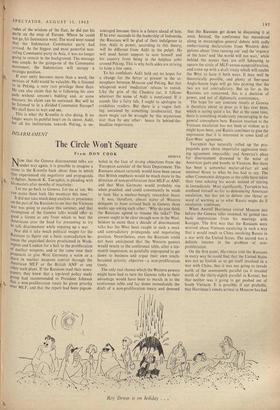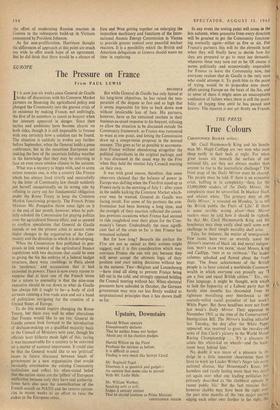DISARMAMENT
The Circle Won't Square
From ,DON COOK
GENEVA
Now that the Geneva disarmament talks are under way again, it is possible to imagine a scene in the Kremlin back about June in which that experienced old negotiator and propaganda in-hghter, Semyok K. rsarapkin, is pleading with his masters after months of inactivity :
'Let me go back to Geneva. Let me at 'em. We can make them look like monkeys this time.'
It did not take much deep analysis or prescience on the part of the Russians to see that the Vietnam War was going to escalate this summer, and that resumption of the Geneva talks would offer as good a forum as any from which to beat the Americans over the head for presuming to try. to talk disarmament while stepping up a war.
Nor did it take much political insight for the Russians to figure out a basic contradiction be- tween the anguished desire proclaimed in Wash- ington and London for a halt to the proliferation of nuclear weapons, and at the same time their Proposals to give West Germany a voice or a share in nuclear weapons control through the American MLF or the British ANF or any other such plans. If the Russians read their news- Papers, they knew that a top-level policy study group had recommended to President Johnson that a non-proliferation treaty be given priority over MLF, and that the report had been pigeon-
holed in the face of strong objections from the 'European activists' of the State Department. The Russians almost certainly would have been aware that British emphasis would be much more in the direction of non-proliferation than MLF or ANF, and that West Germany would probably rise when prodded, and could conveniently be made to look like a nuclear-hungry revanchist beast.
It Was, therefore, almost naïve of Western delegates to have arrived back in Geneva three weeks ago asking each other: 'Why do you think the Russians agreed to resume the talks?' The answer ought to be clear enough now in the West. Seldom in more than a decade of disarmament talks has the West been caught in such a weak and contradictory propaganda and negotiating position. Nevertheless, even the Russians could not have anticipated that the Western powers would return to the conference table, after a ten- month suspension, so painfully unprepared to get down to business and argue their own much- heralded priority objective—a non-proliferation treaty.
The only real chance which the Western powers might have had to turn the Geneva talks to their advantage would have been to march in' to the conference table and lay down immediately the draft of a non-proliferation treaty and demand that the Russians get down to discussing it at once. Instead, the conference has meandered along in meaningless general debate with sadly embarrassing declarations from Western dele- gations about 'time running out' and the 'urgency of the hour' and 'the world will not wait,' while behind the scenes they are still labouring to square the circle of MLF-versus-nonproliferation, and come up with a draft treaty which will enable the West to, have it both ways. It may well be theoretically possible, and plenty of fine-spun Anglo-Saxon logic' will go into proving that the two are not contradictory. But so far as the Russians are concerned, this is a decision of power, and not of diplomatic convenience.
The hope for any concrete results at Geneva is therefore about as poor as it has ever been, which is saying quite a lot. But at the same time, there is something moderately encouraging in the general atmosphere here. Russian reaction to the Vietnam escalation has not been as violent as it might have been, and Russia continues to give the impression that it is interested in some kind of East-West agreement.
Tsarapkin has naturally rolled up the pro- paganda guns about imperialist aggression mak- ing agreement impossible, and America's pleas for disarmament drowned' in the noise of American guns and bombs in Vietnam. But there has been a somewhat matter-of-fact air and minimal thrust to what he has had to say. The other Communist delegates at the table have taken their time echoing his words instead of tearing in immediately. Most significantly, Tsarapkin has confined himself so far to denouncing American escalation, but has yet to deliver one threat or word of warning as to what Russia might do if escalation continues.
When Averell Harriman visited Moscow just before the Geneva talks resumed, he gained two basic impressions from his meetings with Kosygin. The first was that the Russians were worried about Vietnam escalating in such a way that it would result in China involving Russia in a war with the United States. The second was a definite interest in the problem of non- proliferation.
On the first point, Harriman told the Russians in every way he could find that the United States was not so foolish as to get itself involved in a war with China, that it was not going to invade north of the seventeenth parallel (as it invaded north of the thirty-eighth parallel in Korea), but that neither was it going to get pushed out of South Vietnam. It is possible, if not probable, that Harriman's timely arrival in Moscow has had
Roy Dewar is on holiday .
• 11
the effect of moderating Russian reaction in Geneva to the subsequent build-up in Vietnam announced by President Johnson.
As for non-proliferation, Harriman thought the differences of approach at this point are much too wide to offer much hope of an agreement. But he did think that there would be a chance of East and West getting together on enlarging the inspection machinery and functions of the Inter- national Atomic Energy Commission in Vienna tc provide greater control over peaceful nuclear reactors. It is a possibility which the British and American delegations at Geneva should waste no time in exploring.































 Previous page
Previous page